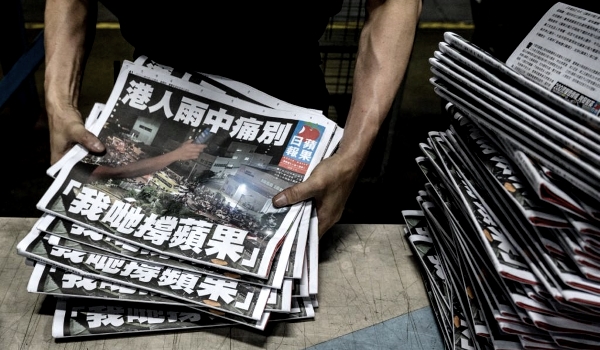By Tay Tian Yan, Sin Chew Daily
Hong Kong's Apple Daily published its final edition on Thursday and has also ended its website.
The event sends a strong ripple across much of the region.
I am not a fan of Apple Daily, and I don't think I agree to the newspaper's provocative and sensual style of reporting. I'm also not a sympathizer of Hong Kong's pro-democracy protestors, and have never approved of the way they destroyed the city with their violent antics.
As such, I have made myself more of a sensible observer and objective analyzer over these past few years of tremendous turbulence in the financial hub.
But, as a journalist of 30 years, the closure of a newspaper not because it lacks readers or market or the ability to transform itself but out of overbearing political pressure, should not make my sensibility and objectivity an excuse for being totally indifferent.
While I do not hold any political position in this matter, that does not mean I feel nothing at all for it.
I am no supporter of Jimmy Lai, nor am I leaning towards the pro-democracy camp. What I'm most concerned about is the media landscape, in particular the existential value of free media in a democratic society.
As a public media tool, the newspaper constitutes an ultimately important hub in the operation of a democratic society.
The newspaper does not belong to the media organization's boss, who holds only the shares. Neither does it belong to the editors and reporting team who are only participants in its production.
The owners of a newspaper are its many readers, and by extension the entire social community. The purchase of a copy of the newspaper signifies a reader's right of possession. By reading a copy of the newspaper, the reader is making himself a participant in its existentiality. The approval of the newspaper's content by the readers translates into their trust and support for it.
By accommodating a newspaper, the society allows it to play its role in shaping this society. Newspapers that boast a strong readership base therefore claim a significantly larger functionality in social participation and shaping.
In other words, whether one likes or dislikes Apple Daily, he is not going to change the reality that it is a part of the Hong Kong society. The higher its circulation, the larger the component part it is of the city. No one can deny that it is one of the vital constituents of the Hong Kong society, just as New York Times is to the American society and The Times is to the British.
Needless to say, the media has an obligation to oversee the government and bridge the readers to the government in conveying important messages and concepts, even to be tasked with the duty of verifying information and rectifying misinformation in more recent years.

Apple Daily started as a paparazzi-style tabloid known for its fishy news offerings that later turned to be one cooking up political news. On the one hand this could have been attributed to the leadership role of Jimmy Lai, on the other hand it was the continuous politicization of the Hong Kong society and the growingly powerful anti-China sentiment that made Apple Daily a natural benchmark in the territory.
It is therefore understandable that the city's pro-Beijing authorities are very unhappy with Jimmy Lai and his editors.
In any democratic society, the right way of dealing with political rivals and dissident media should be one of tolerance and accommodativeness by accepting their right of existence, and to convincingly dismiss their allegations by way of sound governance and performance.
Let the readers and the market decide whether a newspaper is right or wrong, not the party with a conflict of interest to pass down biased judgment.
An open-minded and magnanimous regime should come to see the inevitability of criticisms and public scrutiny which should be viewed in a positive light as a force that will propel it ahead.
With whatsoever reason or excuse, the detention of Lai and his editors and freezing of the media company's assets citing the national security law are not the least creditworthy.
Closing down Apple Daily will not turn Hong Kong's pro-democracy followers into avid supporters of Carrie Lam's administration, but will make them hate her much more, while turning the centrists into sympathizers of pro-democracy struggles.
To dissolve the political conflicts and divergent ideologies, the Hong Kong government should convince the citizens through sterling political performance in building mutual trust, not to clamp down dissidents.
The territory's prided freedom and diversity have lost their shine following the demise of Apple Daily which also marks the end of a great era.
ADVERTISEMENT
ADVERTISEMENT


































